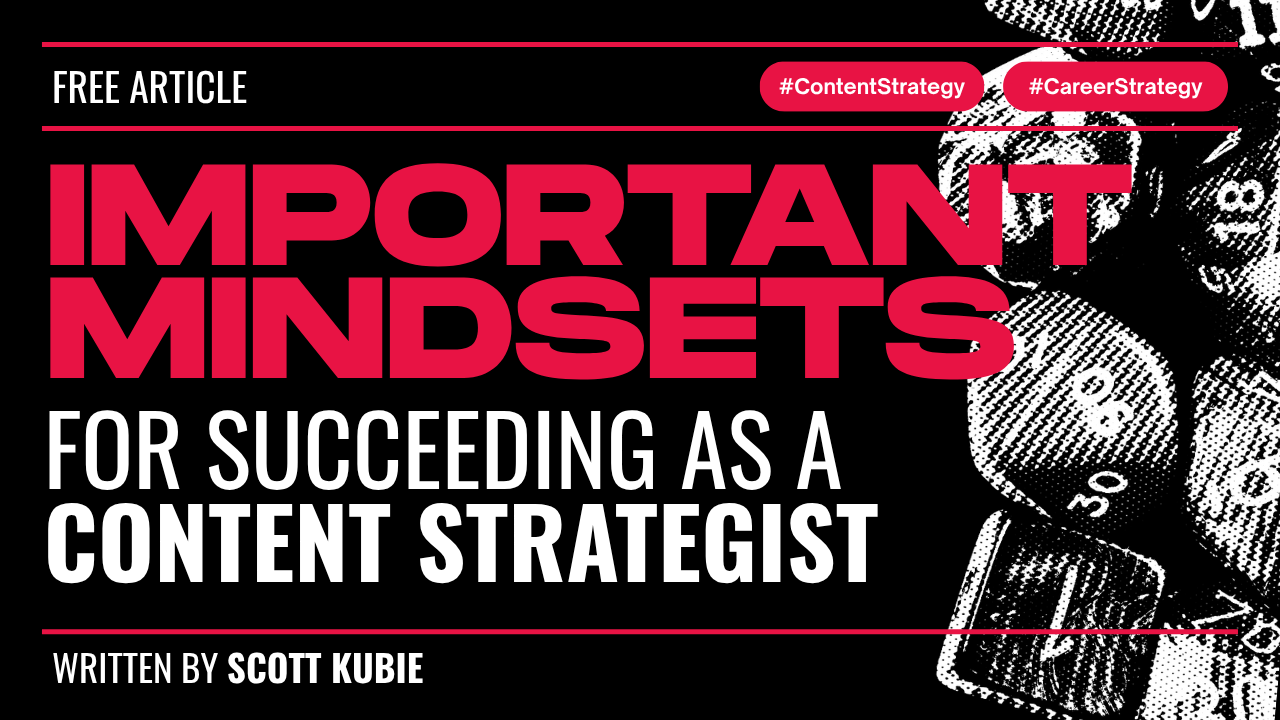Mindsets for Content Strategy Success
Jul 17, 2025
Hint: It's not 'love for the Oxford comma'.
I've introduced a lot of folks to content strategy, a complex and broad topic. It can be intimidating to newcomers. Folks naturally want to know if they're cut out for this work and what sort of qualities make for a good content strategist.
My short answer is always facilitation, which I consider to be the core of true content strategy work. But there's a lot more to it than that!
So: What qualities can help a content strategist succeed in their work? I've identified 11...mindsets, perhaps?...shared by the best content strategists I know. You don't have to max your points in all of these stats, so to speak, to get started, but the more you can level them up, the more success you'll have. Let's go!
You are a willing and able facilitator.
You don’t have to like facilitation, necessarily, but you do have to do it. You know that facilitation is guiding people toward an aim, and that in content strategy that’s often a decision about their digital strategy: audiences, channels, content types, policies, and so on.
You are comfortable doing new things with an audience.
You know that using an approach or tool for the first time on a real-world project is common and natural as a content strategist. You will do your best to prepare, to collect guides and resources, to seek guidance…but you also know that you will have to figure out a LOT of things while you go, and that you will make mistakes, and that that’s okay.
You don’t mind raining on parades.
You are comfortable saying “no” and “not now”, and you can explain why you’re saying no or not now, and you know whom you can say no to and whom you have to say “not now” to even though that still means no.
You can deliver unhappy insights or visualize the impossibility of a plan knowing that it will suck the air out of the room…and you know to have some options and recommendations ready to bring it back in.
You have a knack for creating shared understanding.
You can hear when two people are using a word in slightly different ways, or two words to mean the same thing, deftly draw attention to it, and get them speaking the same language.
You start meetings and conversations by articulating shared goals and objectives. You constantly bring attention back to why, why, why.
You don’t mind repeating yourself 20 or 30 times, and then 20 or 30 more.
You understand in a deep way that alignment is not the same thing as consensus.
And that consensus—a soft, implied sort of general agreement—is pretty much useless compared to alignment, which is true shared understanding of what is and is not happening, and acquiescence to that plan.
You can tell when a decision has actually been made, versus when it only seems like it’s been made
And how desperately, vitally important it is to not let conversations and workshops end with faux-decisions and imaginary alignment.
You are comfortable explaining to adults why they might not get what they want.
You know that not everyone is going to like you, and not everyone is going to like the plan, and that not everyone can get their favorite toppings on the pizza, and that’s just life. You know that the unhappy feelings, even the arguing, even if directed at you, isn’t really about you.
You have a natural instinct toward systemizing and operationalizing.
But you also don’t let it paralyze you. Some mess is tolerable, but you’re always looking for opportunities to scale impact and reduce needless rework.
You can cut to the heart of the matter and know when to do it.
You can see the conclusion of the digital strategy conversation before the people who are having it, and you’re happy to let them have it for a while, because the longer they talk the more the conclusion will feel like their idea. But you also know that if you don’t intervene it might go on forever.
You have a highly-sensitive bullshit detector.
And have learned how to sensitively call it out.
You’re not hung up on labels.
You know that the role is not the title, the work is not the job, and the job is not your life. You don’t need to have Content Strategist on your business card to feel confident doing this work.
Get Scott's best stuff by email.
Join my personal mailing list where I share new tools and insights for writers, designers, and other creatives.
I don't share list info with anyone. No spam. Unsubscribe any time.


